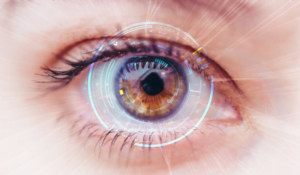
Although getting a new pair of glasses can be thrilling, it’s important to give your brain and eyes some time to adapt to the changes. A few sensations might surface during this changeover period, but have no fear—they are quite natural.
The Adaptation of the Brain
Your brain takes some time to adjust to the new prescription and the way your new glasses fit on your face when you first put them on. It could take some time for you to adjust, and during that time you might feel a little dizzy or off-balance.
The Prismatic Effect: A Deciphering
With your new glasses, you might feel a prismatic effect even though your prescription hasn’t changed much. The minor changes in how the lenses refract light are what cause this illusion. The prismatic effect makes items first appear slightly displaced when seen vertically through the lenses.
Accept the Transition Period
Although the prismatic effect can initially feel unsettling, your brain is surprisingly adaptable, so don’t worry. Your brain will rapidly learn to correctly interpret the visual data as you continue to use your new glasses, and the prismatic effect will lessen.
Advice for the Transition
Follow these practical advice to make the move easier:
- Keep Your Movements Moderate: During the early period of adjustment, try to avoid gazing up or down too much. As your brain gets used to the new spectacles, gradually include these movements.
- Be Wary of Vehicles and Stairs: When climbing stairs or entering and exiting cars, pay close attention because your first depth perception can feel off.
Looking for Expert Advice
After wearing your new spectacles for a while, you should make an appointment with an optometrist if you have persistent nausea, giddiness, or pain. To achieve optimum comfort and vision, certain elements—such as frame curvature, pantoscopic tilt, or lens design—might need to be adjusted.
Conclusion
It takes time and patience to become used to a new pair of glasses. Any initial dizziness will go away as your brain adjusts to the new prescription and prismatic impact. Seeking professional advice from an optometrist will help guarantee that your glasses provide the best vision and comfort possible if you have issues or discomfort after the initial adjustment period.
Frequently asked questions
The time needed for acclimation differs from person to person. Some people could need a few days, while others might need a few weeks. Patience is essential, and regular use of the new spectacles speeds up adaption.
No, the prismatic effect is only momentary and should fade as your brain gets used to your new spectacles. After a sufficient amount of adjustment, if you continue to experience noticeable visual changes, make an appointment with your optometrist for additional testing.
During the transition period, it’s typically advisable to switch to your new spectacles full-time. Your brain will adjust to the prescription and any pain more rapidly if you wear the new glasses frequently.
Regularly wash your glasses with mild soap and water or a gentle cleaning solution. 5. Can I adjust the frame of my new glasses at home? Avoid using corrosive or abrasive substances to avoid harming the lenses or coatings.
As the frame needs precise adjustments to achieve the greatest fit and visual performance, it is not advised to undertake frame modification at home. For expert frame adjustments, go to an optician or an optometrist.





Recent Articles:

Alleviating Digital Eye Strain: Tips for Screen Users

The Truth About Seeing in the Dark

The Myth of Green Improving Eyesight

The Dangers of Looking Directly at the Sun

The Risks of Using Smartphones in the Dark on Eye Health

An Examination of Visual Phenomena for “Ghost Images”




